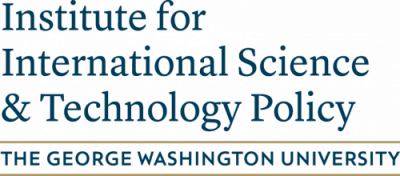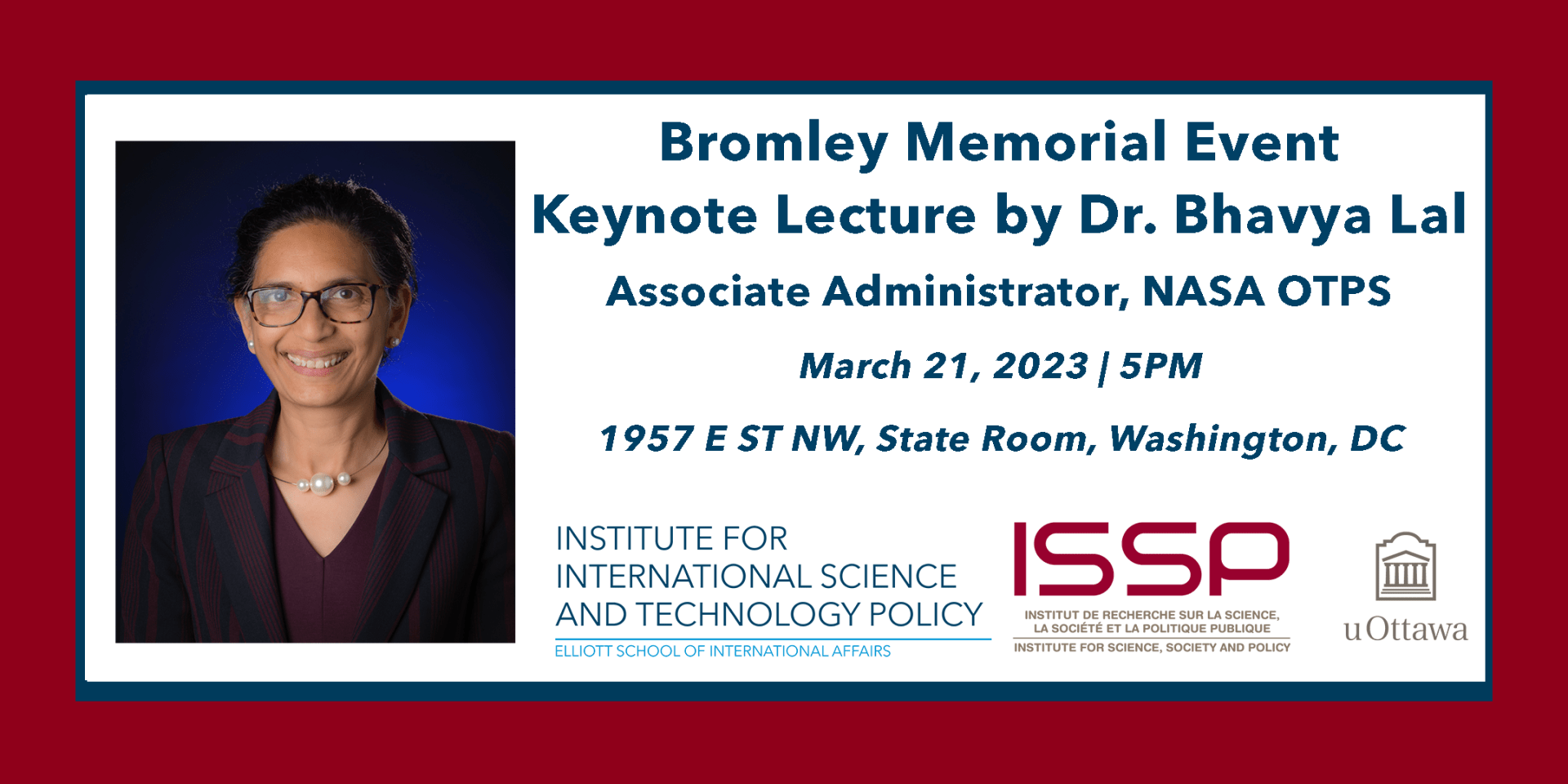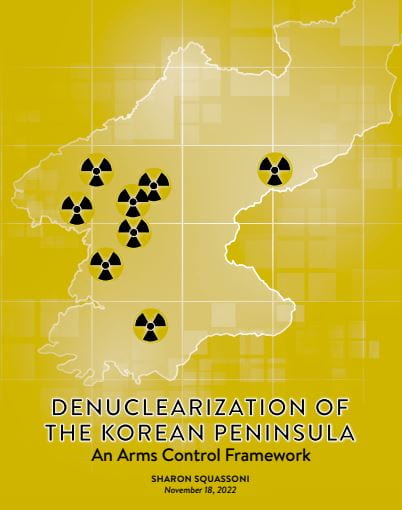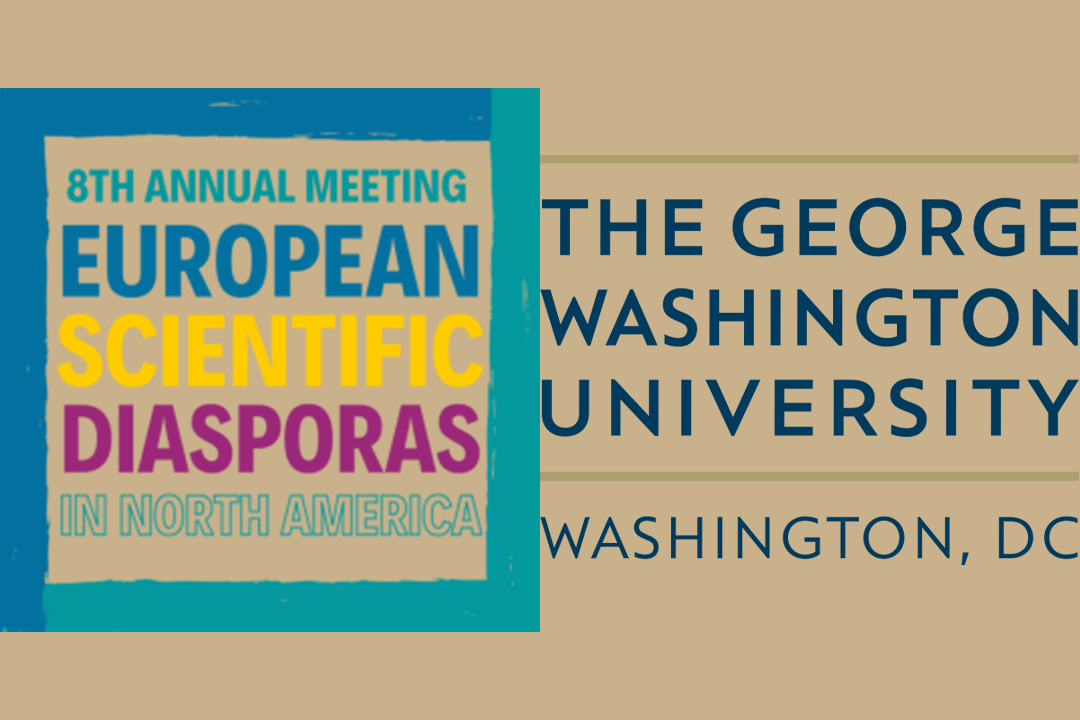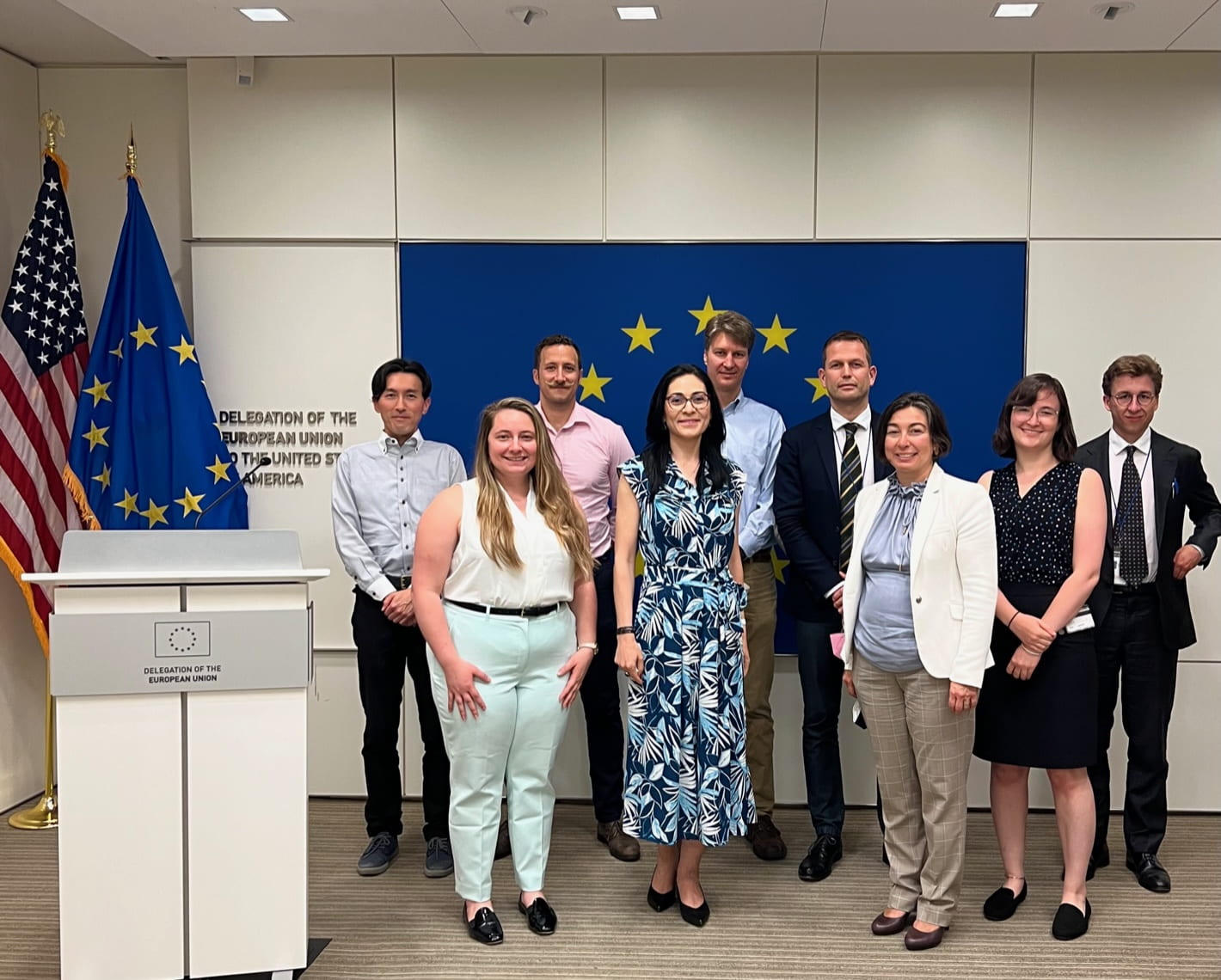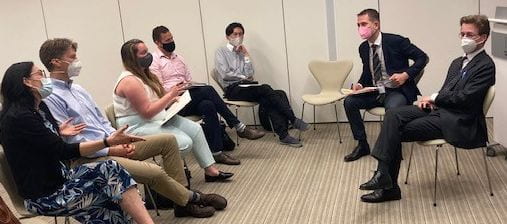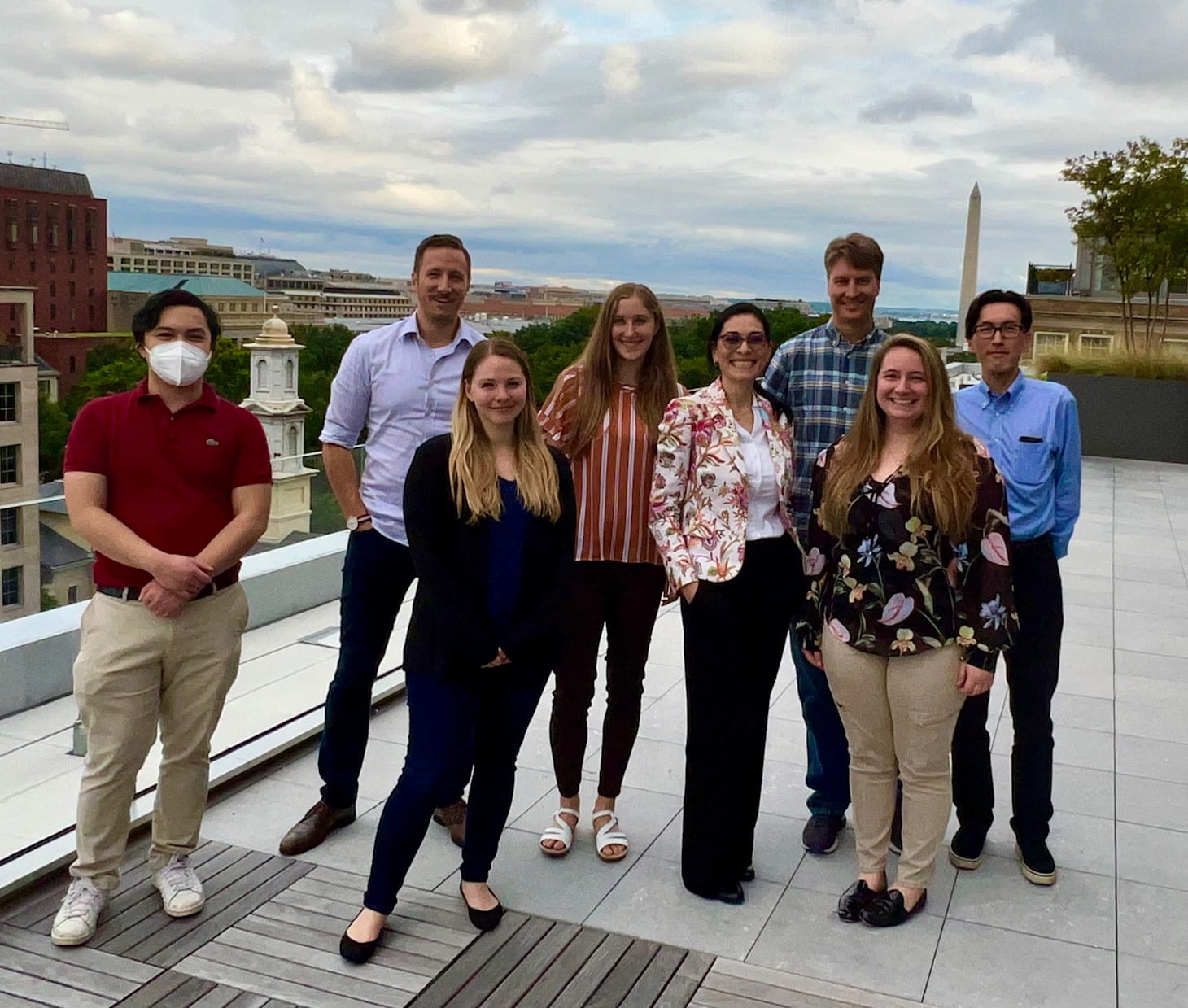About the Institute

Through publications, conferences, and cutting edge research, the Institute for International Science and Technology Policy (IISTP) catalyzes collaboration among scientists, policy experts, government officials, and industry leaders on science and technology issues. A linear descendent of a GW research presence that dates back 50+ years, the IISTP carries out research projects on various aspects of science and technology policy, many sponsored by a variety of government and non-government organizations, organizes seminars and symposia, and hosts visitors from other parts of the United States and overseas. In addition, the IISTP manages, in collaboration with colleagues from the Space Policy Institute (SPI), the Elliott School’s Master of Arts and certificate programs in International Science and Technology Policy (ISTP) and provides a field of study for the doctoral program of the Trachtenberg School of Public Policy and Public Administration (TSPPPA).
New and Noteworthy
2025 Bromley Memorial Lecture: Dr. Rob Atkinson
We were delighted to host the 2025 Bromley Memorial Lecture at The George Washington University, in celebration of 20 years of this lecture series. The lecture was delivered by Dr. Rob Atkinson, President of the Information Technology and Innovation Foundation.
With the election of Donald Trump as President, the U.S. science community faces significant challenges, especially reduced funding. As such, it can continue doubling down on the Vannevar Bush approach to science policy as it has for 75 years and likely face continued budget cuts. Or it can chart a new course for science policy explicitly focused on aligning U.S. science policy with key national goals, especially the techno-economic competition with China. Atkinson discussed why the prevailing “Bush” model is no longer a valid guide to policy and will lay out a new framework to guide science and engineering policy.
The event was co-organized by the Institute for International Science and Technology Policy and the Institute for Science, Society & Policy at the University of Ottawa. We thank those who were able to join us in person, and those who took the time to follow virtually. If you were unable to attend, please check out the full recording above.
NATO’s Agenda on Emerging and Disruptive Technology
Engaging with NATO’s Defense Innovation
Accelerator for the North Atlantic (DIANA)
|
|
NATO’s latest Strategic Concept describes emerging and disruptive technology as a defining feature of the Alliance’s strategic environment, in the context of Great Power Competition. Alongside Allied Command Transformation’s leadership in shaping NATO’s response, the Alliance has also launched a new Defense Accelerator for the North Atlantic (DIANA) to meet the challenge, preserve the Allies’ technological primacy, and ensure that emerging technologies can yield more opportunities than risks. In the framework of George Washington University’s Memorandum of Understanding with NATO’s Allied Command Transformation, GWU’s Elliott School will launch a new initiative on these topics by convening a seminar on January 30th, which will comprise keynote speeches by the leadership of DIANA’s North American office in Halifax, Nova Scotia, and the Canadian Embassy; panel discussions on the geostrategic & security impacts of emerging/disruptive tech as well as NATO’s agenda in response; and an information session on related career paths.
|
|
|
The Institute for International Science & Technology Policy, in collaboration with the Space Policy Institute, co-hosted on March 7th a hybrid event titled New Perspectives on China’s Approach to Emerging Technologies.
About the Event
China’s investment in emerging technologies with both civil and military applications has captured headlines around the world. From artificial intelligence to reusable spacecraft, Beijing intends to be a world leader in many of the technologies that have significant implications for military power and economic competitiveness. This panel will feature three internationally recognized experts on China’s policies concerning space, cyber conflict, and artificial intelligence.
Agenda:
12:00 PM Opening Remarks from Professor Scott Pace, Director of SPI & IISTP
12:10 PM Panel discussion
- Professor Fiona Cunningham, University of Pennsylvania
- Professor Lincoln Hines, Georgia Tech
- Professor Jeffrey Ding, George Washington University
- Moderated by SPI Professor Aaron Bateman
Your content goes here. Edit or remove this text inline or in the module Content settings. You can also style every aspect of this content in the module Design settings and even apply custom CSS to this text in the module Advanced settings.

Technology is key to America and the world’s equitable development. New technologies such as artificial intelligence (AI) and nanotechnologies can increase productivity and efficiency, facilitate communication, improve human health, and enable more people to take advantage of opportunities. At the same time, technology can undermine human rights, lead to job insecurity, and even threaten national security and social stability. To anticipate and mitigate such problems, developers must ensure that the development, deployment and governance of technologies are achieved in an ethical, transparent, and democratic manner. GW faculty can play an important role in facilitating technology in the public interest through research, education, and service.
On March 6, GW will convene an interdisciplinary gathering of faculty whose teaching and research intersects with the growing field of public interest technology—designing and deploying of technologies that advance the public interest. All members of the GW faculty are cordially invited to attend. We will introduce GW’s new Public Interest Technology Scholars, and also hear about new programs from federal agencies that can fund projects in this area.
Snacks will be provided outside the room following the program to allow time for participants to network and forge new collaborations.
Agenda:
- Vice Provost Pamela M. Norris will announce GW’s three new public interest technology scholars who will describe their work and hopes of encouraging more interdisciplinary teaching and research that serve the public interest:
- Dr. Susan Ariel Aaronson, Research Professor of International Affairs; Director, Digital Trade and Data Governance Hub; and co-PI, NIST-NSF Trustworthy AI Institute for Law and Society
- Dr. Alexa Alice Joubin, Professor of English; Women’s, Gender and Sexuality Studies; Theatre; International Affairs; and East Asian Languages and Literatures; and Founding Co-Director, Digital Humanities Institute
- Dr. David Karpf, Associate Professor of Media and Public Affairs
- Dr. Zoe Szajnfarber will describe GW Designing Trustworthy AI Systems (DTAIS), a National Science Foundation Research Traineeship that supports PhD students conducting research at the intersection of artificial intelligence and human work systems. Dr. Szajnfarber will also discuss her efforts to encourage public interest technology.
- Representatives from Lewis-Burke Associates, a government relations firm specializing in research and education organizations, will provide information on pertinent federal funding opportunities.
- An opportunity for questions and discussion among attendees.


About the Event
On February 21st, 2024, the Institute for International Science and Technology Policy and Elliott School Book Launch Series co-hosted the event Sharing Nuclear Secrets: Trust, Mistrust, & Ambiguity in Anglo-American Nuclear Relations Since 1939, featuring co-author Dr. Anthony Eames. Dr. Alyssa Ayres, Dean of GW’s Elliott School of International Affairs offered opening remarks and Dr. Eames followed with his keynote book talk. The Q&A session was moderated by Dr. Aaron Bateman to close things out.
About the Book
Nuclear alliances are high stakes partnerships with the potential to enhance security, goodwill, scientific and technical innovation, and economic well-being; or, they risk a state’s very existence, generate social and political unrest, and fracture frameworks for international cooperation and jeopardize global reputations. Now entering its eighth decade, the Anglo-American nuclear alliance is the oldest and most complex in the world. Sharing Nuclear Secrets is the first comprehensive single-volume study of the Anglo-American nuclear relationship, illuminating both its fragility and durability. It has waxed and waned based on the preferences of presidents and prime ministers, weathered war scares, overcome isolationist impulses and imperial decline, persisted despite public antipathy, and has survived and been strengthened by scientific rivalries.
Trust and ambiguity are entangled at the core of the Anglo-American nuclear relationship. The interplay between trust and ambiguity has influenced the way the nuclear partnership has been institutionalized at bureaucratic and technical levels, but also the ways in which political actors and private citizens have maintained the relationship through periods of crisis, moments of triumph, and through decades of cultural reckoning with nuclear weapons. From the days of the Manhattan Project, through the crisis of Suez and criticism of Dr. Strangelove, to the end of the Cold War, and into present day circumstances brought about by the JCPOA, AUKUS, and Russian nuclear threats over Ukraine, Sharing Nuclear Secrets reveals that ambiguity is key to keeping the balance between sentiment and interests and the corresponding equilibrium between trust and mistrust in the special relationship.
About the Author
Anthony Eames is the Director of Scholarly Initiatives at the Ronald Reagan Presidential Foundation and Institute, where he oversees the development of academic alliances and is responsible for fellowships and programs to support scholarship on the Reagan presidency, legacy, and era. He holds a Ph.D. in history from Georgetown University and an M.A. jointly conferred from King’s College London and Georgetown University. He is the author of A Voice In Their Own Destiny: Reagan, Thatcher, and Public Diplomacy in the Nuclear 1980s (UMass) and co-author, with John Baylis, of Sharing Nuclear Secrets: Trust, Mistrust, and Ambiguity in Anglo-American Nuclear Relations Since 1939 (Oxford). He has spoken and published widely on nuclear and national security issues in journals and other outlets, including for The Journal of Military History, Technology & Culture, and War on the Rocks. In addition to his work at the Institute, Anthony teaches for George Washington University’s Elliott School of International Affairs.
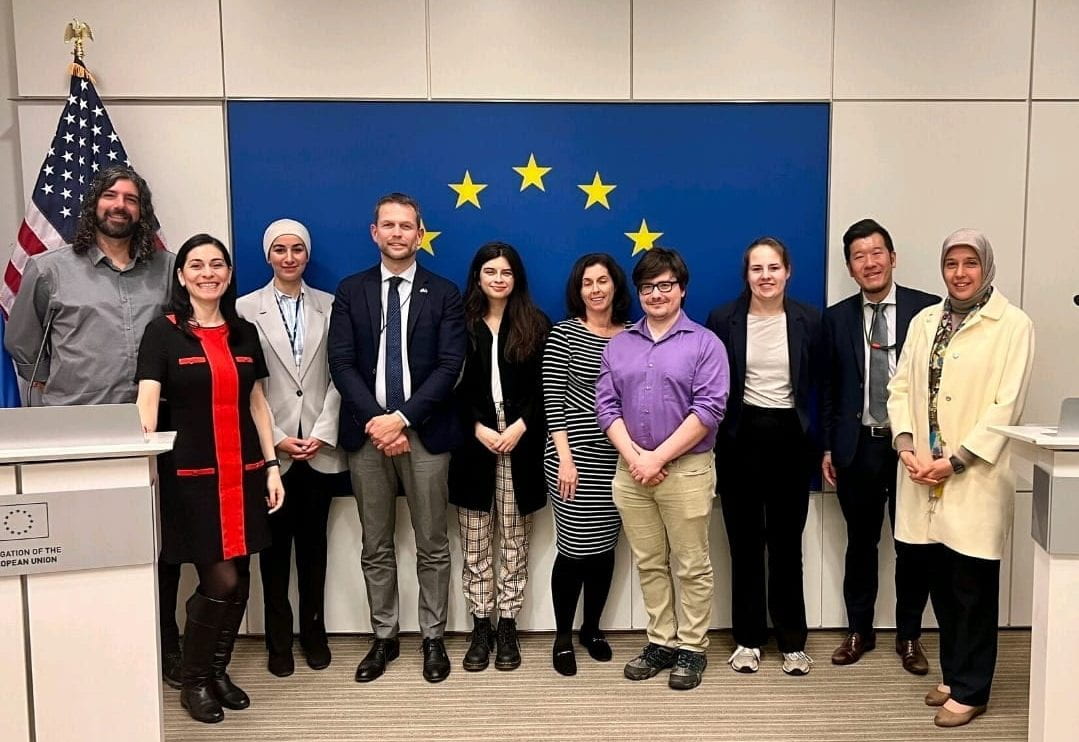
On February 9th, 2024, Dr. Derya Buyuktanir Karacan organized a site visit for ISTP students in her class Contemporary Science Diplomacy. The group was welcomed at the Washington office of the Delegation of the European Union to the United States by Science Counsellor Florent Bernard.

Data Analytics for Policy Professionals
Data Analytics for Policy Professionals (DAPP) is an executive education program that aims to bridge the gap between data science and traditional analysis in international affairs and public policy. Broadly speaking, our goal is to take the lead in providing our current and future policymakers with the modern analytic tools they need to revolutionize policy in information-rich environments. By empowering policy professionals to harness their organization’s data, we can help them to improve the flow of their daily operations, deepen their understanding of policy, and provide evidence-based recommendations for best policy practices.
Course Line-Up for Spring 2024:
- Jan: Mapping Data: GIS for Presentations, with Dr. Adam Wunische
- Feb: Creating Data Rich Reports, with Dr. Emmanuel Teitelbaum
- March: Research & Data 101, with Dr. Leonardo Antenangeli and Dr. Laila Sorurbakhsh
- April: Communicating Data with Web Apps, with Dr. Emmanuel Teitelbaum
- May/June: Survey Design for Public and International Policy, with Dr. Eric Kramon
- June: Data Visualization Using Tableau, with Dr. Paul Albert
All courses also include our keynote speaker and networking event on Friday 5/3, 5:30 – 8:30 pm. The DAPP website provides specific dates/times and application deadlines.


On November 30th and December 1st, global leaders in research, industry, thought and policy including multiple members of ongress convened at the George Washington University for the fifth edition of the Athens Roundtable on Artificial Intelligence and the Rule of Law, a summit on ethical AI development and governance.
Co-founded and sponsored by the nonprofit The Future Society, this year’s edition of the roundtable featured more than a dozen co-sponsors, including GW’S Institute for International Science and Technology Policy; NIST-NSF Institute for Trustworthy AI in Law & Society; the Embassy of Greece in Washington, D.C.; OECD; World Bank; Center for AI and Digital Policy; UNESCO; Homo Digitalis; IEEE; Paul, Weiss LLP; Arnold & Porter; and the Patrick J .Mcgovern Foundation. The event is an opportunity to share knowledge across disciplines and, through that dialogue, develop future-proof policies with real-world impact in a rapidly evolving field.
- Discussed a comprehensive approach to the governance of generative AI and foundation models, encompassing safety assessments, security measures, and regulatory strategies from development to deployment.
- Examined how international coordination and institutional innovation can address geopolitical and market pressures in AI governance while upholding fundamental rights.
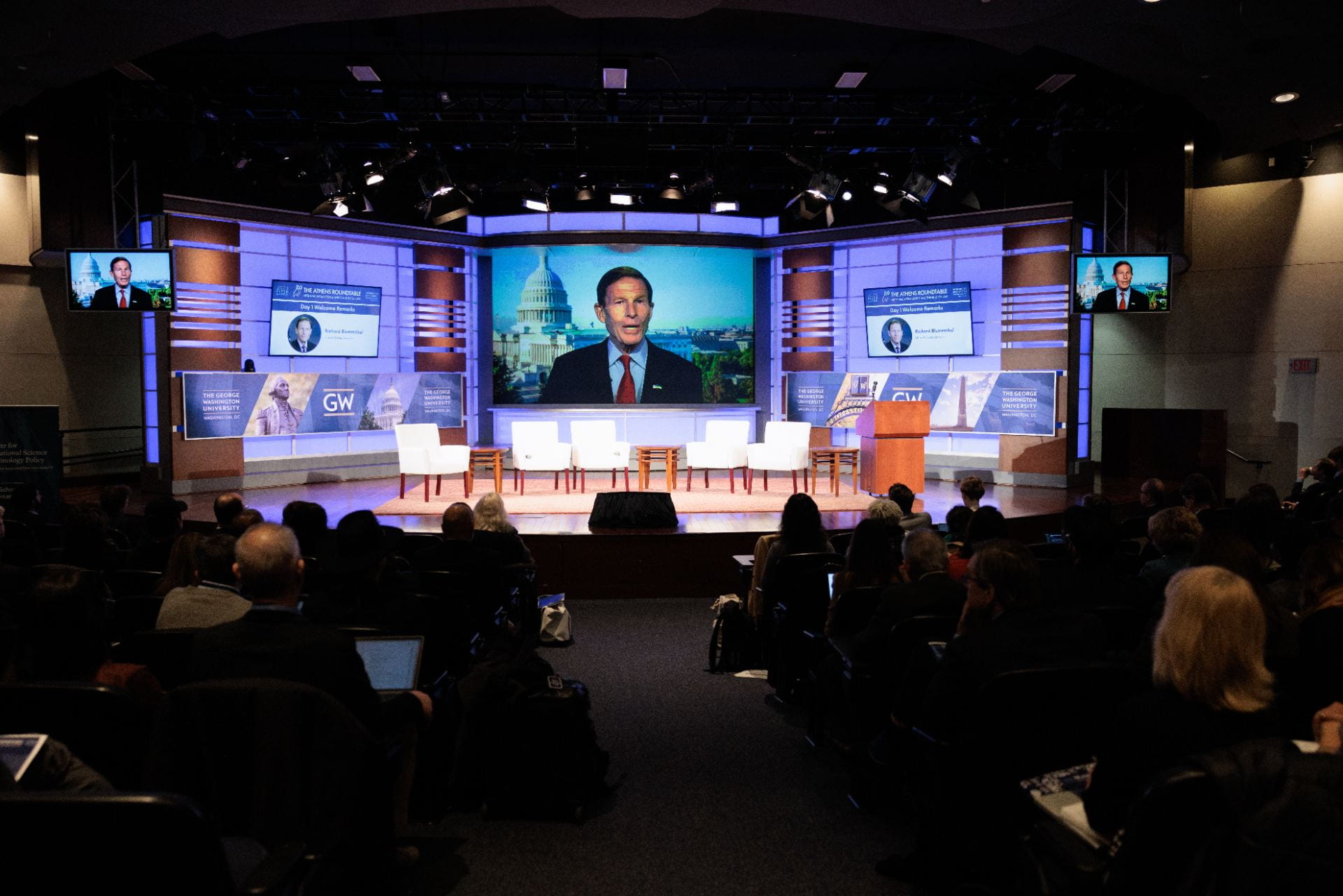
Webinar: Database Language Standards – SQL and GQL
The Institute for International Science and Technology Policy is pleased to invite you to our latest webinar on the topic of Database Language Standards – SQL and GQL.
The international database language standards committee published a new version of the SQL database language standard in June 2023 and is completing a new standard for the Database Language GQL. This presentation:
- Provides context for what a standard is
- Introduces the SQL Database Language standard and its history
- Introduces the GQL database language standard and its history
- Examines the intersection between SQL and GQL standards – SQL/PGQ
About our speaker
Keith Hare is the President of JCC Consulting, Inc., a database consulting company specializing in high performance database systems, database administration, and data replication and migration. Since 2005, Keith has also served as convenor of ISO/IEC JTC1 SC32 WG3 Database Languages, the committee responsible for the SQL and GQL database language standards.
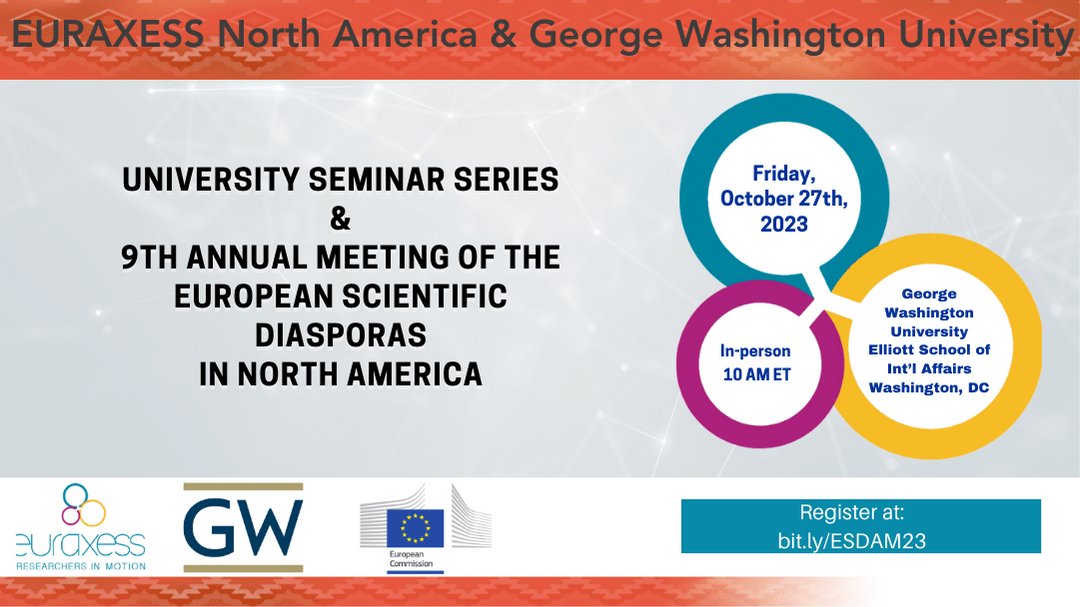
Teaming Up: Leveraging Networks towards a Stronger Global Approach to Research and Innovation Science.
This was the third activity of the GWU Seminar Series on Science Diplomacy and the Ninth Annual Meeting of the European Scientific Diasporas in North America
Friday, October 27, 2023 | 10:00AM EDT


Nuclear Ethics
Wednesday, October 18, 2023
12:30-2:00 p.m.
Room 505 (Elliott School of International Affairs)
Light refreshments will be served. This event is on the record and open to the press.
Join the Institute for International Science and Technology Policy for a discussion with Stanford University Professor Scott Sagan and Nuclear Threat Initiative President Joan Rohlfing.
The Institute for International Science and Technology Policy is pleased to host a discussion with two nuclear experts on the topic of “Nuclear Ethics.” Scott Sagan and Joan Rohlfing authored articles published in the Spring 2023 issue of Ethics & International Affairs, revisiting the topic of Harvard Professor Joe Nye’s 1986 book, Nuclear Ethics. “Just and Unjust Nuclear Deterrence” by Sagan and “The Myth of ‘Just’ Nuclear Deterrence: Time for a New Strategy to Protect Humanity from Existential Nuclear Risk” by Rohlfing can be found here.
Speakers
Scott D. Sagan is Co-Director and Senior Fellow at the Center for International Security and Cooperation, the Caroline S.G. Munro Professor of Political Science, and the Mimi and Peter Haas University Fellow in Undergraduate Education. He also serves as Chairman of the American Academy of Arts and Sciences’ Committee on International Security Studies. Before joining the Stanford faculty, Sagan was a lecturer in the Department of Government at Harvard University and served as special assistant to the director of the Organization of the Joint Chiefs of Staff in the Pentagon.
Sagan is the author of Moving Targets: Nuclear Strategy and National Security (Princeton University Press, 1989); The Limits of Safety: Organizations, Accidents, and Nuclear Weapons (Princeton University Press, 1993); and, with co-author Kenneth N. Waltz, The Spread of Nuclear Weapons: An Enduring Debate (W.W. Norton, 2012). He is the co-editor of Learning from a Disaster: Improving Nuclear Safety and Security after Fukushima (Stanford University Press, 2016) with Edward D. Blandford; co-editor of Insider Threats (Cornell University Press, 2017) with Matthew Bunn; and co-editor of The Fragile Balance of Terror (Cornell University Press, 2022) with Vipin Narang. Sagan was also the guest editor of a two-volume special issue of Daedalus: Ethics, Technology, and War(Fall 2016) and The Changing Rules of War (Winter 2017).
In 2022 Sagan received the Thérèse Delpech Memorial Award from the Carnegie Endowment for International Peace, an award given for “exceptional service to the nongovernmental nuclear policy community.” He received the 2018 Andrew Carnegie Fellowship from the Carnegie Corporation of New York. In 2017, he received the International Studies Association’s Susan Strange Award which recognizes the scholar whose “singular intellect, assertiveness, and insight most challenge conventional wisdom and intellectual and organizational complacency” in the international studies community. Sagan was also the recipient of the National Academy of Sciences William and Katherine Estes Award in 2015, for his work addressing the risks of nuclear weapons and the causes of nuclear proliferation. The award, which is granted triennially, recognizes “research in any field of cognitive or behavioral science that advances understanding of issues relating to the risk of nuclear war.” In 2013, Sagan received the International Studies Association’s International Security Studies Section Distinguished Scholar Award. He has also won four teaching awards: Stanford’s 1998-99 Dean’s Award for Distinguished Teaching; Stanford’s 1996 Hoagland Prize for Undergraduate Teaching; the International Studies Association’s 2008 Innovative Teaching Award; and the Monterey Institute for International Studies’ Nonproliferation Education Award in 2009.
Joan Rohlfing is president and chief operating officer of the Nuclear Threat Initiative (NTI). She provides overall leadership and guidance on NTI’s strategic priorities and direction, catalyzes new project activities and innovation work streams and is responsible for managing NTI’s day-to-day operations.
Rohlfing became president and chief operating officer of NTI in January 2010, after nine years as NTI’s senior vice president for programs and operations. She is responsible for managing all NTI programs and operations.
She was part of the original team that created the mission and scope for NTI in 2000. Once the organization launched in 2001, she played strategic roles in several of NTI’s hallmark projects such as the formation of the World Institute for Nuclear Security, the creation of the Middle East Consortium on Infectious Disease Surveillance and the Nuclear Security Project led by former Secretary of State George P. Shultz, former Secretary of Defense William J. Perry, former Secretary of State Henry A. Kissinger and former Senator Sam Nunn in their effort to galvanize global action to reduce urgent nuclear dangers and build support for reducing reliance on nuclear weapons, ultimately ending them as a threat to the world.
Before joining NTI, she held senior positions with the U.S. Department of Energy during the Clinton Administration, as senior advisor for national security to the Secretary of Energy and as director of the Office of Nonproliferation and National Security. In 1999-2000, after the nuclear tests in India and Pakistan, Rohlfing served at the U.S. Embassy in New Delhi, India where she advised the ambassador on nuclear security issues. Earlier, she served as a professional staff member of the U.S. House Armed Services Committee. Rohlfing began her career in the Office of the Secretary of Defense, where she was awarded a Presidential Management Internship and later worked in the office of Strategic Forces Policy.
Rohlfing holds a master’s degree from the University of Maryland and a bachelor’s degree from the University of Illinois. She was awarded the Department of Defense Civilian Service Medal in 1989. In 2011, the University of Maryland School of Public Policy gave her the Distinguished Alumnus of the Year Award, citing her career in public service.
Rohlfing is a Gender Champion in Nuclear Policy and a member of the Council on Foreign Relations.
Douglas Shaw (Moderator) is a Senior Advisor at the Nuclear Threat Initiative and a Research Professor of International Affairs at the George Washington University’s Elliott School of International Affairs.
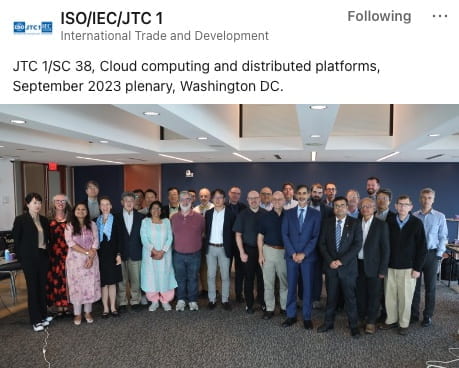
IISTP HOSTED SC 38 PLENARY
September 18-22, 2023
Discuss and consider cloud commuting standards
Elliott School meeting rooms
The hosting of the SC 38 Plenary is normal in the long history of IISTP supporting science and technology. The SC 38, as part of the ISO-IEC/JTC 1 organization represents the highest level of commitment by scientists and engineers to advance science and technology standards through democratic norms, voting on approval or rejection for each standard. Throughout the world in a mesh of representatives from around the globe, the ISO-IEC/JCT gives voice to the technical concerns, solutions, and standards for our modern high-technological age.
From September 18-22, 2023, IISTP hosted the ISO-IEC/JTC 1, SC 38 Cloud Computing and Distribution Platforms Plenary in meeting rooms in the Elliott School. This SC 38 Plenary included 35-40 national body delegates from across the world. The meetings of working groups 3 and 4, 1 and 5 discussed and considered the below standards and topics. The SC 38 expressed a grand gratitude for the warm welcome and assistance with the facilities of the Elliott School.
New Item Highlights:
• Cloud and Edge Networking
• Dataspaces, concepts and characteristics
• Cloud service customer business continuity and resilience
• Trustworthiness in cloud computing
Amendments and revisions of standards by SC 38:
• Revision to 19941-1 Interoperability and portability
• WG 3 creation of an ad-hoc group for alignment of 22123 series (Vocabulary, terminology, and reference architecture)
• Creation of an ad-hoc to provide comments on DTS 38508 – Governance implications of shared digital service platform among ecosystem organizations
Comparing AI Regulatory Models: A Discussion With Professor Anu Bradford
Wednesday, August, 9, 2023 | 11AM-12PM EDT | Online
Despite their desire to nurture various forms of AI, many of the world’s policymakers are ready to regulate AI risks as well as business practices. On August 9, at 11:00 am EDT, the Hub will host a discussion of Anu Bradford’s new book Digital Empires: The Global Battle to Regulate Technology. Professor Bradford examines three competing regulatory approaches—the American market-driven model, the Chinese state-driven model, and the European rights-driven regulatory mode. She also explores how governments and tech companies navigate the inevitable conflicts that arise when these regulatory approaches collide in the international domain. Professor Bradford will speak for 15 minutes, Dr. Patrick LeBlond from the Graduate School of Public and International Affairs, University of Ottawa will provide ten minutes of comments, and then we open the floor to your questions.
Please register to receive you link to join the webinar.

Webinar: Let’s Make Virtual Worlds More Livable – Ideas to Prevent Metaverse Harms
Thursday, July 20th, 2023 | 12PM-1PM EDT
Register to receive your link to join the event.
The metaverse does not exist, yet policymakers in the EU and South Korea, for example, have drafted strategies, made significant investments, and already debated potential rules. However, the technologies, platforms, and tools to make these virtual worlds are already in wide use. In this webinar, Shannon Pierson of the Minderoo Centre for Technology and Democracy, Cambridge University, will present her report on potential harms in the metaverse and how they can be addressed. Pierson focuses on the key technology –extended reality (XR) examining related issues of governance, human rights, and cybersecurity. Dr. Louis Rosenberg, XR pioneer and CEO of Unanimous AI, will comment on the paper and then, as always, we will open it up for audience questions.
IISTP Professor Jeffrey Ding co-authors article for Foreign Affairs:
The Illusion of China’s AI Prowess Regulating AI Will Not Set America Back in the Technology Race.
International Association of Privacy Professionals (IAPP) Global Privacy Summit 2023: A Student Perspective
In the spring of 2023, ISTP MA candidate Ashley Schuett attended the IAPP Global Privacy Summit and authored a student summary with analysis on the action and import of the summit:
The IAPP Global Privacy Summit: A Snapshot of Current Privacy Issues
The International Association of Privacy Professionals (IAPP) Global Privacy Summit was held in Washington, D.C., on April 4-5, 2023, and was attended by privacy professionals, policymakers, regulators, and academics from all over the world. I was able to attend thanks to a generous grant from ISTP.
The first thing that caught my attention was the commercialization of privacy. The event looked similar to any big tech conferences. Which contrasted with what I normally experience in settings that focus on the privacy of technology, a niche concern. Instead, there were many booths set up to sell products to help companies stay in compliance with new privacy legislation. Among other companies trying to sell privacy products.
Beyond the booth floor the conference provided an opportunity to discuss the most pressing privacy issues and concerns of today, including intimate privacy, enforcement, obstacles, AI governance, a cookie-less world, and data protection. This article will highlight some of the current conversations on these topics.
Intimate Privacy as a Moral and Legal Right
Danielle Citron, the author of “The Fight for Privacy: Protecting Dignity, Identity and Love in the Digital Age,” gave a compelling keynote making the case for intimate privacy as a civil and human right. She shared a story of a woman who was recorded in a hotel room, with those videos unknowing and without consent being posted online. The video went viral with her name, and she was unable to get it removed. Despite seeking help from law enforcement, they merely brushed it off, saying “Boys will be boys.” She also shared the story of a Russian site that offered to take it down in exchange for their own private show. Danielle argued that intimate privacy is a moral right and a civil right, which everyone should be able to enjoy as a legal right. Being a civil right would mean it cannot be traded away without a good reason. Danielle called for Congress to be involved in this matter and eliminate the legal shield that big tech corporations enjoy. Instead, these companies should be held responsible for protecting people’s intimate privacy.
Enforcement and Obstacles
The conference discussed the role of enforcement in protecting people’s privacy. Several cases were discussed on the European Data Protection Board (EDPB) website of best practices for deciding on cross-border cases. The obstacles that are being faced include administrative issues that require legal initiative. There is an expectation of a legislative proposal in the near future to address challenges such as timeline differences in different member states, administrative issues, and cooperation. This is to regulate how member states cooperate and provide additional regulation.
AI Governance in the US and EU
The conference also focused on AI governance in the US and EU. The AI Act was a topic of discussion, and the EDPB was critical of the act as it has limited applicability in today’s technological landscape. The AI Act applies to all member states and is directly applicable. However, it is hard to apply to general-use AI since it was originally written to apply to specific AI (e.g. facial recognition), not general AI (e.g. generative as like Chat-GPT). The conference discussed the AI Bill of Rights and how it is applicable to these new technologies.
Cookie-less World
The conference also focused on the cookie-less world and how the removal of cookies from browsers could be worse for people’s privacy. Specifically, the depreciation of cookies from Google’s Chrome browser was discussed, and it was noted that the technology is moving toward first party data. First part data would mean that Google would use the information that it collects on you, instead of the data that is bought from data brokers. App Tracking Transparency was discussed, and it was noted that it only applies to 3rd party data, not to first party data. This was important because of Apple’s iOS 14.5 update which created a system-level prompt allowing users to choose if an App on their phone was allowed to track them.
There are many issues with technology and privacy preservation that where highlighted. However, the US has still not passed a federal data privacy law. While there continues to be new legislation introduced it does not seem, at least in the US, that there will be protections for citizens data under the law. Instead, we are relying on the knock-on effects of the legislation that has been passed in the EU, with the EU issuing 1.65 billion euros in GDPR fines.
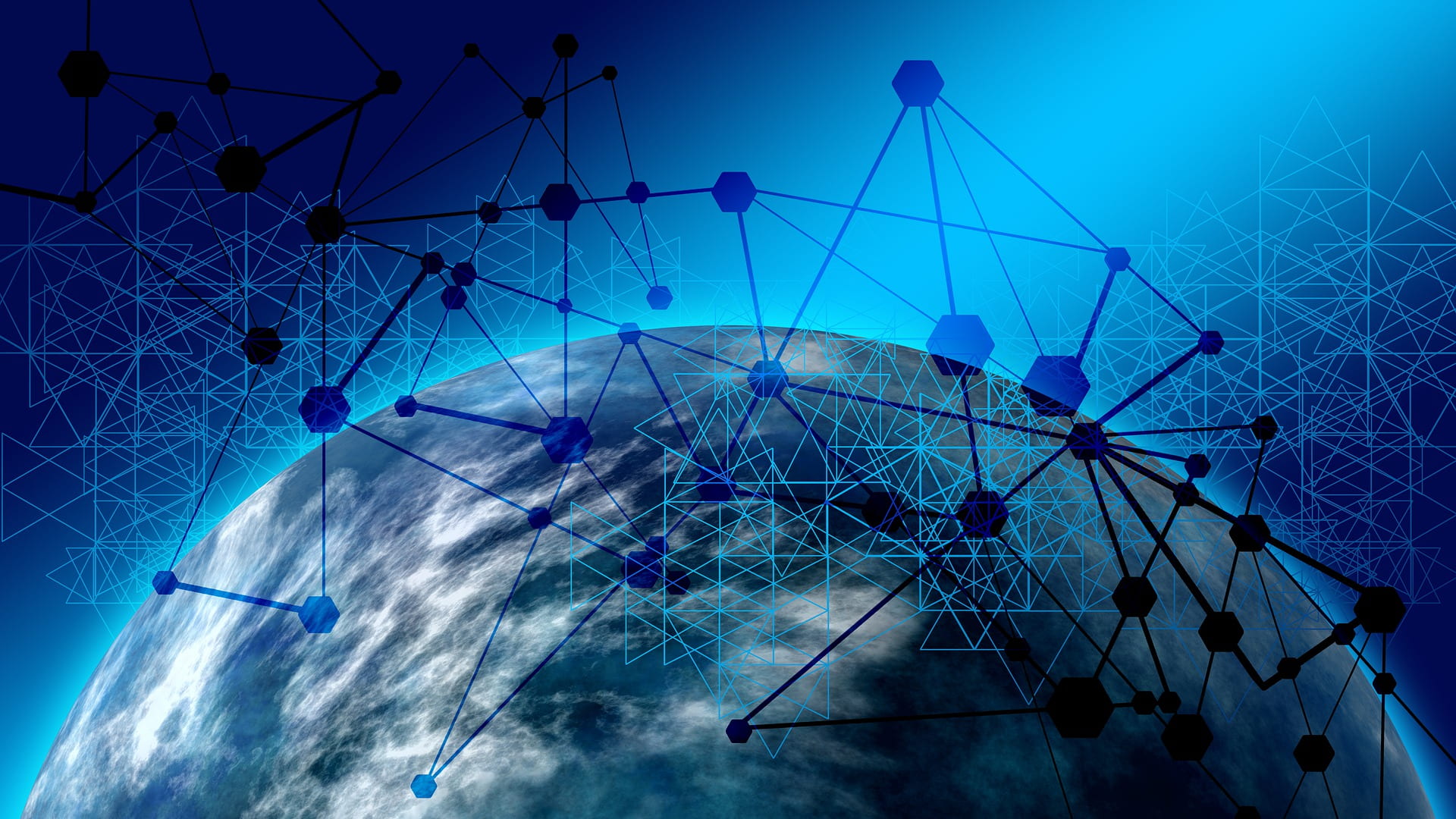
Science and Technology Diplomacy in the Context of the United States’ New Techno-Industrial Strategy
May 31, 2023 | 10:00AM-12:00PM EDT
This discussion is the second event in the GW Seminar Series on Science Diplomacy.
The event recording is now available.
About the Event
12:00PM: Welcome Remarks, Profess Aaron Bateman, Space Policy Institute, George Washington University
12:05PM: Keynote Speech, Seth Center, Deputy Special Envoy for Critical and Emerging Technology, US Department of State
12:30PM: Panel Discussion
- Jason Donovan, OES/STC Director, US Department of State
- Florent Bernard, Science Counselor, EU Delegation in Washington, DC
- Koji Aribayashi, S&T Counselor, Embassy of Japan in Washington, DC
- Kim Montgomery, Director of International Affairs and Science Diplomacy, AAAS
- Moderated by Scott Pace, Director Institute for International Science and Technology Policy and Space Policy Institute, George Washington University
This hybrid event is open to the media and the public and it will be recorded. Feel free to join us in-person at the Elliott School of International Affairs or online via Zoom.
Light breakfast will be provided.
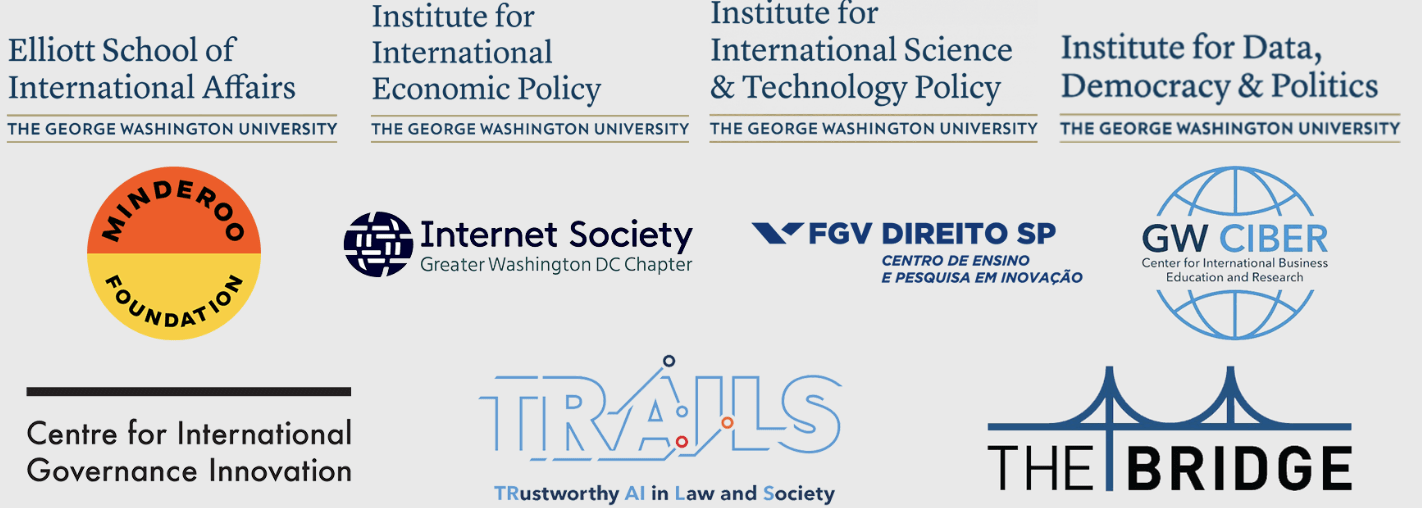
Congressman Don Beyer Chats with Computer Scientist Hal Daumé III
Friday, May 12, 12:00-1:00 PM EDT
Like many Americans, members of Congress are struggling to understand the costs and benefits as well as the workings of various forms of AI. But Congressman Don Beyer is not your average member. Like other members, he serves on several committees, including the Joint Economic Committee and the House Committee on Ways and Means. However, Beyer also enrolled as a student in artificial intelligence at George Mason University because he is fascinated by AI and wants to apply his understanding to legislation. In this webinar, Hub friend Professor Hal Daumé will ask the Congressman about his coursework, how his understanding of AI can help other members keep up with the technology, and whether and how Congress should regulate high-risk AI.
Speaker:
– Congressman Don Beyer, 8th District, Virginia.
Moderator:
– Professor Hal Daumé III, Volpi-Cupal Family Endowed Professor in Computer Science, University of Maryland, and co-author of Language (Technology) is Power
Recent Trends in China’s Large Language Model Landscape
Jeff Ding publishes new paper for AI Center for Centre for the Governance of AI.
Read the complete article.

Space and Cybersecurity
April 25, 2023 | 1PM EDT
Elliott School of International Affairs, Room 505
The event recording is now available.
The Space Policy Institute and Institue for International Science and Technology Policy are pleased to present a panel discussion focusing on the nexus of space and cybersecurity.
AGENDA
1:00PM: Keynote Remarks
- Scott Pace, Director, Space Policy Institute, George Washington University
1:10PM: Panel Discussion
- Gil Baram, Affiliate of Stanford University’s Center for International Security and Cooperation
- Melissa Griffith, Senior Lecturer in Technology and National Security at Johns Hopkins University
- Neil Sherwin-Peddie, Head of Space Security and Enterprise Security at BAE Systems Digital Intelligence, former Deputy Head of Information Assurance at the U.K. Foreign Office
- Moderated by Aaron Bateman, Assistant Professor, Space Policy Institute, George Washington University
This will be a hybrid event. You’re welcome to join us in-person at 1957 E ST NW or online via Zoom. Please register to receive more information on how to access the event. The event is open to the public and media and it will be recorded.
Introducing: International Science and Technology Policy Faculty Course Offerings, Fall 2023
(08/24/23 – 12/11/23)
| Course Number | Course Title | Professor | Schedule |
| IAFF 6141 | International Science and Technoogy Policy Cornerstone | Nicholas Vonortas | Meets every Tuesday, 5:10pm-7:00pm |
| IAFF 6145 | U.S. Space Policy | Scott Pace | Meets every Thursday, 5:10pm-7:00pm |
| IAFF 6146 | Space Law | Henry Hertzfeld | Meets every Tuesday, 3:50pm-5:50pm |
| IAFF 6148 | Space and National Security | Pete Hays | Meets every Monday, 7:10pm-9:00pm |
| IAFF 6157 | ISTP Capstone Workshop | Otaviano Canuto and Rich Leshner | Meets Monday, 5:10pm-7:00pm |
| IAFF 6158 | Special Topics in International Science and Technology Policy: Science Diplomacy | Anthony Eames | Meets every Wednesday, 5:10pm-7:00pm |
| IAFF 6158 | Special Topics in International Science and Technology Policy: Artificial Intelligence Policy Challenges | Carol Kuntz | Meets every Wednesday, 5:10pm-7:00pm |
| IAFF 6158/ECON 6255 | Special Topics in International Science and Technology Policy: Economics of Technological Change | Nicholas Vonortas | Meets every Monday, 7:10pm-9:00pm |
|
IAFF 3190 *Undergraduate course, shouldn’t be taken by graduate students. |
Space Policy | Scott Pace | Meets every Tuesday and Thursday, 11:10am-12:25pm |
For more details on these courses, please visit our academics page.

ISTP Capstone group attends EDRi event in Brussels as part of their Capstone project.

Nuclear Security: Our View from Vienna with Ambassador Laura Holgate
March 17 | 1PM | 1957 E ST NW, Lindner Commons (Room 602, 6th Floor), Washington, DC
GW’s Institute for International Science and Technology Policy is honored to welcome Ambassador to the Vienna Office of the United Nations and the International Atomic Energy Agency, Laura Holgate. Ambassador Holgate will offer brief remarks, focusing on nuclear security, before opening the discussion to Q&A.
Dean of the Elliott School of International Affairs, Alyssa Ayres, will give welcoming remarks and Research Professor Doug Shaw will moderate the Q&A.
This will be an in-person event following Chatham House Rule.
About the Speaker
Laura S.H. Holgate serves as U.S. Ambassador to the Vienna Office of the United Nations and to the International Atomic Energy Agency, advancing multilateral approaches to reduce global threats and seize opportunities in the areas of nuclear nonproliferation, nuclear security, verification of the Iran nuclear deal, nuclear energy, nuclear testing, counterterrorism, anti-corruption, drug policy, cybercrime, and export control. She previously held the position from July 2016 to January 2017.
From 2018 to 2021, Ambassador Holgate was vice president for materials risk management at the Nuclear Threat Initiative (NTI), responsible for designing and executing NTI’s activities to prevent nuclear terrorism, such as reducing quantities and enhancing security of nuclear and radiological materials around the world, promoting cooperation between the United States and key partners on nuclear and radiological security, and strengthening the global nuclear security architecture.
Ambassador Holgate co-led the creation of Gender Champions in Nuclear Policy, launched in November 2018, to increase the presence, visibility and impact of women in nonproliferation, nuclear deterrence, nuclear security, disarmament, nuclear energy and related areas. During her previous ambassadorial posting, she promoted gender balance in the staff and programming of the Vienna-based international organizations, laying the groundwork for the creation of the Vienna chapter of the International Gender Champions, and is proud to have joined this chapter in March 2022.
Ambassador Holgate served as the special assistant to the president and senior director for weapons of mass destruction terrorism and threat reduction on the U.S. National Security Council from 2009 to 2016. In this role, she oversaw and coordinated the development of national policies and programs to reduce global threats from nuclear, biological and chemical weapons; detect, identify, secure and eliminate nuclear materials; prevent malicious use of biotechnology; and secure the civilian nuclear fuel cycle. She was the U.S. Sherpa to the Nuclear Security Summits and co-led the effort to advance the President’s Global Health Security Agenda.
Holgate was a founding Vice President of NTI, leading its Russia/New Independent States programs from 2001 to 2009. Prior to that, she directed the U.S. Department of Energy’s Office of Fissile Materials Disposition from 1998 to 2001, and was special coordinator for cooperative threat reduction at the Department for Defense from 1995 through 1998, where she provided policy oversight of the “Nunn-Lugar” Cooperative Threat Reduction program.
Holgate received a Bachelor of Arts Degree in politics from Princeton University and a Master of Science Degree in political science from the Massachusetts Institute of Technology, and spent two years on the research staff at Harvard University’s Belfer Center for Science and International Affairs at the Kennedy School of Government. Holgate is a member of the Council on Foreign Relations.
Bromley Memorial Keynote Lecture
Tuesday, March 21, 2023 | 5PM | 1957 E ST NW, State Room (7th Floor), Washington, DC 20052
The event recording is now available.
About the Event
The Institute for International Science and Technology Policy (IISTP) at GW’s Elliott School and uOttawa’s Institute for Science, Society, and Policy (ISSP) are pleased to host the 2023 Bromley Memorial Keynote Lecture, featuring Dr. Bhavya Lal, Associate Administrator, NASA OTPS. Dr. Lal will lend her extensive experience and expertise to the subject of international and other policy challenges and opportunities that need to be addressed as we endeavor to go to the Moon and then Mars. Her remarks will be followed by brief remarks from two student responders and the event will finish with an audience Q&A.
About the Speaker
Dr. Bhavya Lal is the associate administrator for the NASA Office of Technology, Policy, and Strategy (OTPS) within the office of the NASA administrator. She provides executive leadership, direction, and evidence-driven advice to NASA leadership on internal and external policy issues, strategic planning, and technology investments. Lal also previously served as the acting chief technologist of NASA and was the first woman to hold the position in over 60 years of NASA history. Before her current role and in the first 100 days of the Biden Administration, she was the acting chief of staff at NASA, directing the agency’s transition under the administration of President Biden.
Lal has over 20 years of experience as an active part of the space technology and policy community, having worked for government sponsors, federal departments, and agencies, and chaired, co-chaired, or served on multiple committees. She has more than 50 papers published in peer-reviewed journals and conference proceedings.
Lal received her bachelor’s and master’s degrees in nuclear engineering from the Massachusetts Institute of Technology (MIT) and a second master’s from MIT’s Technology and Policy Program. She earned her doctorate in Public Policy and Public Administration from George Washington University.
About Accessing the Event
This event will take place on March 21, 2023 at 5PM in the State Room at 1957 E ST NW, Washington, DC 20052. It will also be available online, via Zoom. The discussion will be on the record and recorded. Please register for additional information.
About the Bromley Memorial Event
One of the world’s leading nuclear physicists, D. Allan Bromley was born in Westmeath, Ontario, in 1926 and held degrees from Queen’s University and the University of Rochester. Dr. Bromley sat on President Regan’s White House Science Council and was the first person to hold the Cabinet-level rank of Assistant to the President for Science and Technology from 1989 to 1993, a position he held during the administration of George H.W. Bush. D. Allan Bromley died in 2005. To learn more about the life and work of Dr. Bromley, read Dr. Paul Dufour’s reflections on Allan Bromley’s efforts in strengthening the Canada-US STI policy partnership during his tenure as OSTP Director and at Yale.
Founded by Dr. John de la Mothe, a Canada Research Chair and Professor at the University of Ottawa, the annual Bromley Memorial Event is now organized by the University of Ottawa ISSP and the George Washington University IISTP. The two day event provides graduate students from GW and uOttawa with the opportunity to meet and exchange ideas with senior science and technology (S&T) policy advisors from various countries, sectors, and levels of government in Washington D.C. and in Ottawa.
The keystone of the event is the public Bromley Memorial Keynote lecture. Previous keynote speakers have included: Dr. Mona Nemer, Chief Science Advisor of Canada; Dr. Sethuraman Panchanathan, Director of the National Science Foundation; and many more distinguished S&T policy leaders.
Webinar:
The State of AI in China with Dr. Jeffrey Ding
Friday, March 10, 11:00-12:00 PM EST
The event recording is now available.
Market dominance in AI should not be a competition among nations. However, in recent years, some analysts have sounded an alarm– asserting that China, an authoritarian regime, could achieve comparative advantage in AI due to several factors including its large supply of government capital, excellent infrastructure; large supply of well-trained engineers, data, and computer scientists; huge troves of data; and its AI and data governance paradigm.
But recent developments challenge that hypothesis. First, the government has bullied tech managers and investors and altered its approach to regulation. The COVID lockdown has altered investment patterns and US policies have disincentivized shared research and corporate partnership. Finally, Western companies have created widely utilized large visual and language learning models such as DALL-E and ChatGPT. These models have been described as the next platform shift, because they can be easily deployed across existing technologies.
Taken in sum, these developments could have wide ranging impacts on global economic and political relations. Our speaker, Jeffry Ding will provide insights into the state of AI in China, as well as its governance.Speaker:
- Dr. Jeffrey Ding, Assistant Professor, GWU
Moderator, Dr. Susan Ariel Aaronson, Director, Digital Trade and Data Governance Hub, Research Professor and Cross-Disciplinary Fellow, GWU

US-Japan Nuclear Energy Cooperation in Fast Reactors
Friday, March 10 | 6:00PM-8:00PM EST | Online via Zoom
The webinar recording is now available in English and in Japanese.
The U.S. and Japanese public and private sectors are currently cooperating on advanced reactors, also known as “fast reactors.” Both countries pursued the commercialization of fast reactors beginning in the 1950s but halted their programs for different reasons and at different times. The United States halted construction of prototype reactors in the 1990s due to soaring costs, safety issues, and the risks of nuclear proliferation. Japan abandoned its prototype Monju reactor in 2016 for cost and safety issues.
The United States and Japan are now returning to this technology together. The US Department of Energy is financially supporting the construction of demonstration reactors by the private sector and Japan has decided to join the US program.
The cooperation raises interesting questions. Is there any prospect for commercialization of fast reactors in the near future? What are the hoped-for gains? Are fast reactors an effective solution to nuclear waste and climate change? What are the potential nuclear proliferation implications? This event features speakers from the United States, Canada and Japan to discuss the current status, feasibility and implications of promoting the development of fast reactors.
MODERATORS
Sharon Squassoni (Professor, the George Washington University)
Sayo Saruta (President, New Diplomacy Initiative)
SPEAKERS & TOPICS
Frank von Hippel(Professor emeritus, Princeton University)
Interested in nuclear issues on the Korean peninsula? Check out the new report from Research Professor Sharon Squassoni: Denuclearization of the Korean Peninsula: An Arms Control Framework. Check out the full report and the executive summary.
EURAXESS North America and George Washington University (GWU) are co-hosting the Eighth Annual Meeting of the European Scientific Diasporas in North America. This flagship event will be the first activity of the GWU Seminar Series.
Thursday, December 1, 2022 | 10:00AM EST
The event explores the successes and experiences of the European researcher diaspora networks in the United States and Canada and the increasing importance of scientific diasporas. This will be a hybrid event. Guests are welcome to join us in-person at 1957 E ST NW, Lindner Commons (Room 602), Washington, DC 20052 or online via Zoom. Please register for more information on how to access the event online.
This year’s theme is Scientific Diasporas in Science Diplomacy. The free event is open to all researchers in North America, including European researchers as well as current, previous, and potential researchers based in Canada and the U.S. who have or would like to benefit from European research grants to further their careers. Representatives from scientific diaspora networks, European embassies, North American universities, U.S. government, industry, research institutions, and more are also welcome to attend and participate.
The event recording is now available!
XR, AI, & Human Rights
A DataGovHub Webinar | Tuesday, November 1, 2022 12:00PM-1:00PM EDT
View the event recording.
Data-driven technologies such as XR and AI could, if effectively designed and deployed, enhance human rights because they expand individual capabilities. XR uses computer-generated virtual environments to enhance an individual’s capabilities and experiences. AI, in contrast, attempts to replicate the way humans understand and process information and, combined with the capabilities of a computer, process vast amounts of data without flaws. But computers lack moral and ethical reasoning skills although some people assert that computers can be trained with the “right” data. Yet many believe these technologies undermine a wide range of human rights from access to information, privacy, freedom of speech and association, and rights to non-discrimination, for example.
Speaker:
Dr. Louis Rosenberg, a pioneer of virtual and augmented reality for over 30 years and current CEO of Unanimous AI. He has written a variety of pieces arguing that several human rights will be undermined and we will be subject to more fraud and deception.
Moderator: Research Professor Susan Aaronson, Director of the Digital Trade and Data Governance Hub, GWU.
You can email questions in advance to datagovhub@gwu.edu or by using the Q&A function at the bottom of your screen during the webinar. Please note that we will disable chats, video, and audio of attendees.
Please contact datagovhub@gwu.edu with any questions about the webinar or the Hub’s educational efforts.
Introducing: International Science and Technology Policy Faculty Course Offerings, Spring 2023
(01/17/23 – 05/01/23)
| Course Number | Course Title | Professor | Schedule |
| IAFF 6143 | Science and Technology Policy Analysis | Nicholas Vonortas | Meets every Monday, 5:10pm-7:00pm |
| IAFF 6146 | Space Law | Henry Hertzfeld | Meets every Wednesday, 6:00pm-8:00pm |
| IAFF 6151 | Environmental Policy | Nina Kelsey | Meets every Wednesday, 5:10pm-7:00pm |
| IAFF 6153 | Science, Technology, and National Security | Pete Hayes | Meets every Monday, 7:10pm-9:00pm |
| IAFF 6158 | Issues in U.S. Space Policy: Tools and Scenarios | Scott Pace | Meets every Tuesday, 5:10pm-7:00pm |
| IAFF 6158 | Space Economics | Henry Hertzfeld | Meets every Thursday, 5:10pm-7:00pm |
| IAFF 6158/PPPA 8167 | Doctoral Seminar | Scott Pace | Meets every Friday, 6:10pm-8:00pm |
| IAFF 6158 | Science, Technology and Global Statecraft | Aaron Bateman | Meets every Wednesday, 5:10pm-7:00pm |
|
IAFF 3179 *Undergraduate Course |
Space in International Affairs | John Klein | Meets every Monday, 7:10pm-9:40pm |
For more details on these courses, please visit our academics page.
ISTP Science Diplomacy Course Featured in Elliott School State of the School Report 2021-2022.

Webinar: Trade Secret? How AI is Changing Trade and How Trade Agreements Address AI
Time: Friday, September 30th, 9:00-10:00 AM Eastern Time
Access the event by registering at the event website.
Artificial intelligence is both expanding trade and altering trade. Moreover, a growing number of digital trade agreements include language to encourage AI. For example, some include provisions encouraging the free flow of data and/ or language requiring that public data when open be provided in a machine readable format. But policymakers are just beginning to figure out how encourage AI (as example to incentivize multi- sectoral data sharing). Meanwhile, more than 60 countries have AI strategies and 11 have data strategies. Policymakers could alter comparative advantage in data through various approaches to regulating data or the data giants. This webinar will feature two scholars who have recently written on the relationship between AI and trade.
Speakers:
- Emily Jones, Associate Professor, Blavatnik School of Government Oxford
University, author of Digital Disruption: AI and International Trade Policy. - Neha Mishra, Assistant Professor, Graduate Institute, Geneva, author of
Regulating artificial intelligence through digital trade agreements
Moderator: Research Professor Susan Aaronson, Director of the Digital Trade and Data Governance Hub, GWU
The event recording is now available.

The GW Institute for Korean Studies, the East Asia National Resource Center and the Institute for International Science & Technology Policy present:
Korea Policy Forum, Virtual Roundtable Discussion: Global Semiconductor Supply Chain and US-ROK Cooperation
Tuesday, September 20, 2022
9:00 AM – 10:30 AM EDT
Virtual Event via Zoom
Event Description
In recent years, South Korea and the United States have stepped up their discussions and cooperation on economic security. Recognizing the vital importance of the semiconductor industry in particular, the two allies have made bolstering supply chain resilience in this sector a policy priority. In the wake of global semiconductor shortages due to the COVID-19 pandemic, safeguarding these supply chains has been brought to the forefront of policy discussions in both countries. Underscoring the importance of semiconductors to the security of both countries, South Korea and the United States agreed to strengthen their strategic economic and technology partnership at the first Biden-Yoon summit in May 2022. The two allies have since sought to deepen and broaden cooperation on critical and emerging technologies, such as leading-edge semiconductors.
Two leading experts from the U.S. and Korea, respectively, will be joining us to discuss their national economic security strategy and industrial policy regarding the global semiconductor supply chain. The GW Institute for Korean Studies and the Institute for International Science and Technology Policy invite you to join us for an engaging discussion on this important topic.
This event is on the record and open to the public.
The event will be recorded and made available on GWIKS’ YouTube channel
The event recording is now available.
New Course Announcement: Spring 2023
PPPA 8197.80/ IAFF 6158.90 Seminar in Science and Technology Policy
Doctoral seminar on theory and practice in science and technology policy. Critical evaluations of current and historical foundations of science and technology policy. Application of analyses to policy questions and implementation of policy choices in selected fields related to science and technology policy. Prerequisites: The PPPA 8197.80 course is intended for TSPPPA PhD candidates in the S&T field prior to taking their field exams. MA candidates from who have completed the International Science and Technology Policy Cornerstone Seminar (IAFF 6141) may also take the course as IAFF 6158.90. Friday 6:10-8:00 pm, Spring 2023
Taught by ISTP/IISTP/SPI Director, Professor Scott Pace
Science Diplomacy On the Move
This summer’s Science Diplomacy course (IAFF 6158) took learning outside the classroom. Led by Professors Anthony Eames and Derya Karacan, students visited the Ronald Reagan Library Foundation and Dr. Florent Bernard, the science counselor of the EU Delegation to the US. The EU Delegation also returned the favor, stopping by the Elliott School to engage with the class. If you’re interested in Science Diplomacy, next year save a spot on your Summer class roster for the 2023 Science Diplomacy course!
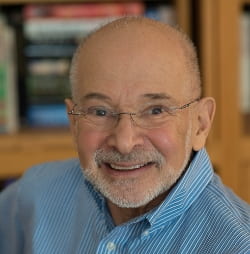
In Memorium
The Elliott School of International Affairs mourns the passing of Dr. Albert H. Teich, research professor of science, technology & international affairs at the Institute for International Science and Technology Policy (IISTP). Dr. Teich came to the Elliott School in February 2012 following a distinguished 32-year career with the American Association for Advancement of Science (AAAS). We are grateful for the life and incredible work of Dr. Teich, and we will continue to celebrate his legacy at the Elliott School and IISTP.
Institute Partnerships
Welcome EURAXESS!
The Institute for International Science and Technology Policy is delighted to welcome EURAXESS North America. As of August 1, 2021 EURAXESS, NA will be colocated with the Institute at the Elliott School. We look forward to many future collaborations.
IISTP is a Proud Sponsor of STGlobal
STGlobal is a graduate-student-led consortium of professional and academic groups, organizing learning-centered events for early-career scholars and practitioners in the social and policy dimensions of science and technology.
The STGlobal flagship event is the annual STGlobal Conference, which provides students with an opportunity to present their original research within a supportive community, gather critical feedback on works-in-progress, network with students and practitioners in related fields, and attend professional development workshops.
Check back soon for more information on the 2023 STGlobal Conference!
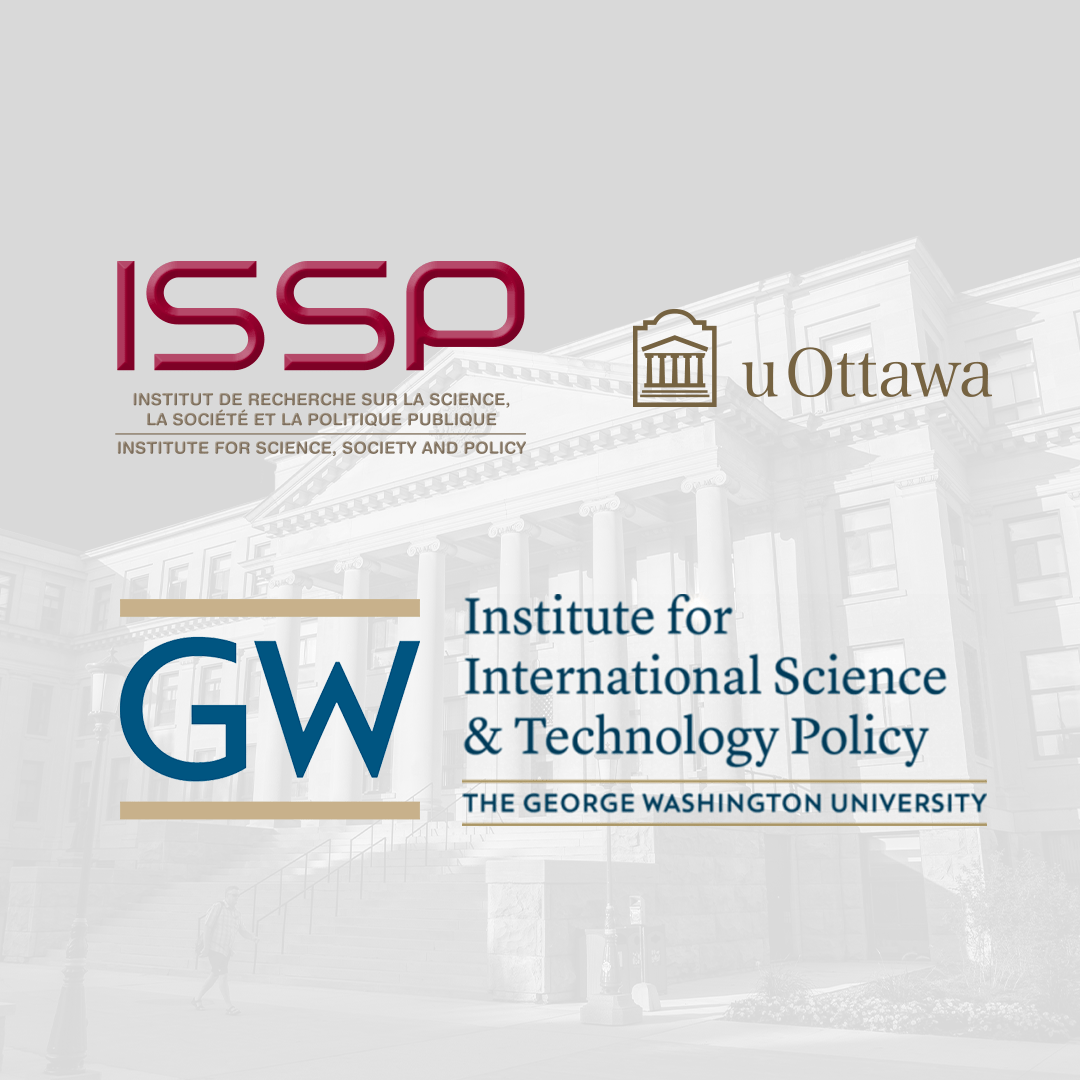
Bromley Memorial
Founded by Dr. John de la Mothe, a Canada Research Chair and Professor at the University of Ottawa, the Bromley Memorial is organized by the University of Ottawa ISSP and the George Washington University IISTP. The annual event provides graduate students from GW and uOttawa with the opportunity to meet and exchange ideas with senior science and technology (S&T) policy advisors from various countries, sectors and levels of government in Washington D.C. and in Ottawa.

InSySPo and UNICAMP
The IISTP is a longtime collaborator with InSySPo – System Innovation: Organizational Strategy, Research & Innovation Policy Governance (unicamp.br), a São Paulo Excellece Chair (SPEC) programme funded by the Research Foundation of the State of São Paulo (FAPESP). InSySPo aims at: (i) reinforcing research excellence on innovation policy and management at the University of Campinas (UNICAMP) (ii) further internationalizing the work of the Department of Science and Technology Policy and of the University; and (iii) placing UNICAMP among the top ranking academic units in the field on a global scale.
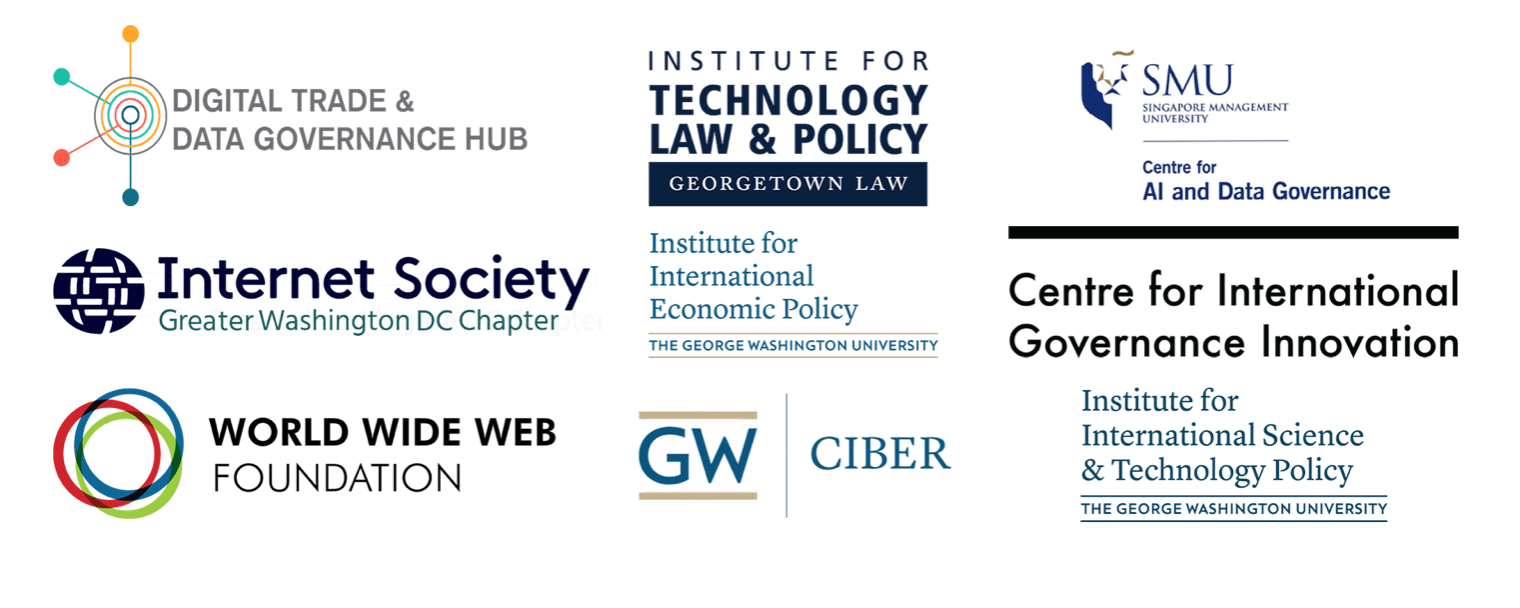
Data Governance Event Series
The Institute is a co-sponsor of the GW Digital Trade and Data Governance Hub led event series focusing on data governance issues.
